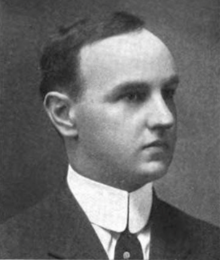Julius Meier (politician)
Julius L. Meier (born December 31, 1874 in Portland , Oregon , † July 14, 1937 in Corbett , Oregon) was an American businessman , non-party politician and from 1931 to 1935 the 20th governor of the state of Oregon.
Early years
Julius Meier studied after elementary school until 1895 at the University of Oregon law. He then worked as a lawyer for four years before he became the manager of a family department store. This warehouse was the largest of its kind in what was then Oregon. Meier remained a manager until 1930 and then became president of the company. During the First World War Meier was regional head of the national defense council. After the war he supported the French reconstruction.
Political rise
Until 1930 Meier was hardly politically active. That year, his friend George W. Joseph was nominated as the Republican Party's top candidate for gubernatorial elections. Joseph died before the election, and the Republicans nominated Phil Metschan, son of a former Oregon Treasury Secretary, as their new candidate. In some points, however, he represented very different political goals than the late Joseph. Its supporters urged Meier to run for governor as an independent candidate with George Joseph's election program. Meier allowed himself to be persuaded and finally won the election with a clear majority: He won 54.5 percent of the vote, the Democrat Ed F. Murphy 25.1 percent and Phil Metschan only 18.8 percent. This election victory was seen as a clear signal for public use of the Columbia River's hydropower to generate electricity. This issue had been a major campaign issue for both Joseph and Meier.
Governor of Oregon
Julius Meier took up his new office on January 12, 1931. In his four-year tenure, he was unable to carry out his plan on the Columbia River because the federal government had taken on the development of this river, but he did manage to stabilize the state's financial position amid the Great Depression . An independent police force was established during his tenure. In addition, an unemployment commission and a new agriculture committee were established. Another commission was created after the prohibition law was repealed by the federal government in 1933 to control alcohol consumption. For health reasons, Meier turned down a new candidacy in 1934. Therefore, he resigned on January 14, 1935 from his office.
Further life
Meier received support from both the Democrats and the Republicans for a candidacy for election to the US Senate . Nevertheless, he declined this offer. He retired to private life in Corbett, where he died in July 1937. Julius Meier was married to Grace Mayer, with whom he had three children.
Web links
- Julius Meier in the National Governors Association (English)
- Oregon State Library ( Memento November 25, 2004 on the Internet Archive )
- Julius Meier in the database of Find a Grave (English)
| personal data | |
|---|---|
| SURNAME | Meier, Julius |
| ALTERNATIVE NAMES | Meier, Julius L. |
| BRIEF DESCRIPTION | American politician |
| DATE OF BIRTH | December 31, 1874 |
| PLACE OF BIRTH | Portland , Oregon |
| DATE OF DEATH | July 14, 1937 |
| Place of death | Corbett , Oregon |

